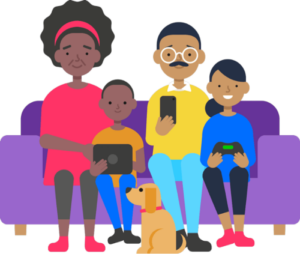From learning how to interact with others online to opening their first social account, our experts provide insight on how to support children through this transition online.
With the added layer of smartphones and social media, the move to secondary can open children to a range of online challenges. From learning how to interact with others online to opening their first social account our experts provide insight on how to support children through this transition online.
How can I manage the step change in my child’s digital life as they start secondary school?
What’s really, really important is getting kids to understand that all the stuff that their parents protected them from and guided them through will now fall into their hands. They are transitioning and as a result, transferring responsibility.
In the same way, parents wouldn’t put their child on the bus to go to school the first time by themselves, they would talk them through the route, do it together and then help them on their way to do the route alone.
Parents should sit down with their child and look at all the things that could go wrong in their digital life and then discuss the solutions. They should discuss misreading texts, if someone has said something that makes them feel bad, data stealing, online bullying – these are all potential issues. And parents should remind their children that because they may face those issues or risks – they are there to help guide them through these challenges.
In the initial stages parents should tell their kids how they are aware of the issues and therefore they will help guide them, then as they become more comfortable, you will trust them to guide themselves through them. Parents should remind their children there’s no power without responsibility – and they should follow your rules. If they are able to navigate issues, they should also feel comfortable to come to parents or an appropriate person when necessary. Give them a sense of how that timeline will work.
What digital challenges do children have to deal with as they make the move to secondary school?
In recent years I could have described, in general terms, a marked difference between the digital behaviours of children leaving primary school and those after a few months into Year 7. Now, however, the key stages are largely indistinguishable with a significant number of students having had a smartphone for some time and, therefore, the opportunity to engage in behaviours that would normally be associated with much older students during their primary years, such as producing, sending, requesting or sharing sexual or bulling images or text, the filming of people without their permission or of peers involved in fights or dangerous activities. This can mean that behaviours can often be normalised even before starting secondary school when the majority of age-appropriate interventions regarding online safety and etiquette takes place.
A minority of children will be given their first smartphone for the first time before starting at secondary school. This creates a significant experiential gap between those students for whom digitally mediated communication is the norm and those who are just starting out. I am noticing an increase in the number of children in the latter group who feel alienated and isolated by the behaviours that they encounter as they go online on their own for the first time and feel significant pressure to engage in activities or view content with which they do not feel comfortable.
Moving to secondary school is all about forging new relationships in a new environment and fitting into that environment. Peer pressure can often become ‘more visible’ to parents and teachers during this transition as children begin (due to adolescent brain maturation processes), to change their identity, want the latest accessories such as particular sports gear, bags, clothes and in today’s world a smartphone. This now means that they have the ability to increase their relationship circles of ‘friends’ through social media ‘adds’ and ‘shares’ of sites and apps.
Some children may be getting their first phone at this age for travelling to and from school alone; it’s important to discuss safe and responsible use before this happens. Set clear boundaries including spending limits (especially if you are paying the bill!) and what apps they can download. Talk about who they should give their phone number to and discuss things such as password safety.
Children may want to use the internet to stay in touch with friends from their old school, as well as make new ones; many children may start to ask to use social networking services to do this. It’s important to remember that most platforms have age limits of 13 or more, so parents should make informed decisions about allowing their children to sign up for accounts. It’s also important to talk about being a good friend online and to be aware that one an image or comment is posted online it can be difficult to control or remove.
How do I start a conversation with my child?
Research shows that while children don’t necessarily want their parents hanging over their shoulder whenever they are online, they do want their parents to talk to them about their online behaviour and to set appropriate boundaries.
As children start secondary school they may face new pressures from friends and peers to behave or dress in certain ways and as they grow up they naturally become more curious about romantic relationships, so it’s important that parents support their children to recognise the risks and encourage healthy online relationships. Talk to your children regularly and discuss your views and values on friendships and relationships. Understand and guide your child’s online behaviour and negotiate and establish boundaries. Make sure your child knows that while you may not always like or approve of what they do –and this includes what they do online, you will always love them and are always there for them.
Parents can help their children with this transition through an empathic approach of compassionate inquiry and genuine interestedness. In today’s world, this is very different from when we moved schools so become interested and take part in their journey and where necessary and possible reflect how different it is to your experience and how you would like to know and understand how it is for them and the meaning they make of this. This will help you identify when children are adding people they don’t know to their social network and opens up a communicative dialogue which is the fundamental foundation for further conversations if and when they feel stuck about issues they may have.
The most important thing is to keep communication open; you want your child to be able to share their worries, as well as successes both on and offline. Talk about the online platforms and games they use; ask them to show you how they work and what they do. This will help keep a dialogue open and honest throughout their time at secondary school.










